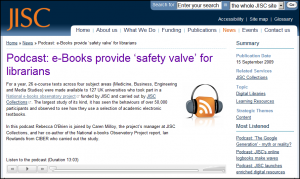JISC offers a growing archive of podcasts.
The 15 September 2009 podcast e-Books provide ‘safety valve’ for librarians caught my eye (and ears). Those interested in how ebooks may impact on scholarly information sharing and dissemination may find the findings of the underlying research by the National E-Books Observatory Project most interesting.

JISC podcast about the National e-books Observatory Project report.
Key points of interest for me were:
- 26 titles and ~50,000 users.
- Digital environment and media facilitates this type of research, e.g. the deep log analysis employed in the study is not possible with analogue media. Consequently, we know remarkably little about how traditional analogue books are being used.
- Power browsing – in and out – short session times – checking facts and references – not reading longitudinally, dipping in and out core materials.
- Researchers suspect print and ebooks were being used in complementary ways.
- Usage peaks and troughs with particularly impact on short loan collections (precipitated by exams, modules?)
- Librarians also perceiving ebooks as supplementary.
- Potential additional revenue stream for publishers and not threat to their income.
The relative paucity of information about how people read analogue scholarly texts (and the difficulty of finding out) does raise the question of whether the user behaviours are digital specific or whether what is being uncovered is what has actually been the norm even in the analogue world, i.e. users (students and academics) have always “power browsed” no matter the medium; it’s just doesn’t do their scholarly street cred any good to admit it. Thus questionnaires are unlikely to establish whether this is the case. Covert observational studies would be too labour intensive and hidden cameras at strategic points would be ethically unacceptable. So I look forward to seeing how the Observatory Project meets that challenge.
Phase 1 of the report is available from the National E-Books Observatory Project web site.
Other podcasts of note in the JISC series include ‘The Google Generation’ – myth or reality? (18 January 2008).


